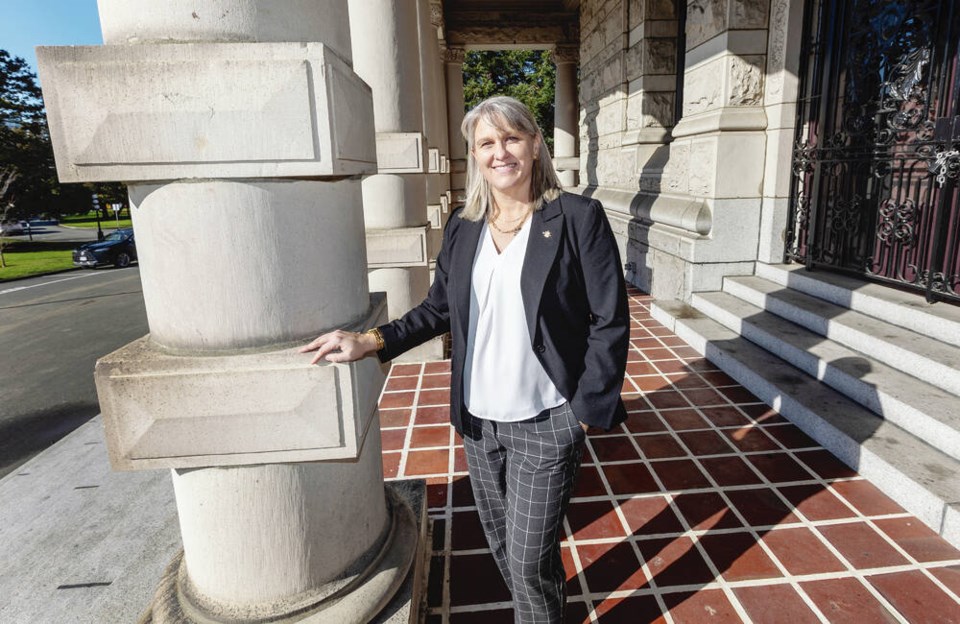Elenore Sturko can still hear the cries of the mother who watched her son jump to his death 14 years ago.
Sturko, a Langley RCMP officer at the time, arrived at the scene to see the distraught mother looking on as paramedics tried, unsuccessfully, to resuscitate the man. The mother had hours earlier brought her son, who struggled with addiction, to hospital after he threatened to kill himself. The hospital didn’t certify the man under the Mental Health Act and sent them home. As the mother drove away from the hospital, the man jumped out of the car and followed through with his threats.
Sturko, who retired from the Surrey RCMP last year after she was elected B.C. Liberal MLA in Surrey South, was diagnosed with post-traumatic stress disorder stemming from the incident and turned to alcohol to cope. Now sober for almost three years, Sturko still thinks of that mother, whose story shaped her position as Opposition mental-health and addictions critic that in some cases, involuntary care can sometimes save lives.
“Someday, I wish I could let that mother know that her son’s life means something,” Sturko told Postmedia News from her office in the legislature. “If I can make any changes to improve the situation for families and people with mental-health issues, I will feel that I have put some meaning into that incident in my life. Because, it was very impactful. It had ripples that affected more than a decade of my life.”
The debate over involuntary care for people with severe mental-health and addictions issues has ramped up amid B.C. Liberal Leader Kevin Falcon’s promise to expand the use of involuntary care in “modernized, compassionate facilities with 24/7 psychiatric and medical supports.”
Premier David Eby previously supported involuntary care for people who overdose repeatedly but has since walked back that position following warnings from mental-health professionals that such a practice could cause more harm than good. Under the Mental Health Act, a person can be held in hospital involuntarily if a doctor determines they’re an imminent threat to themselves or others.
However, Sturko said she’s heard from families who have pleaded with medical professionals to certify their loved one because they were at risk and the individual was sent back home because there were no available beds. In the situation with the mother and son, the man convinced doctors at the hospital he was no longer suicidal.
“I used to get very angry because I was like, ‘Why didn’t they keep this person [in hospital]?’” she asked.
Sturko said her PTSD would flash-up at unexpected times: The sound of sirens wailing would trigger a panic attack, a minor mishap would drive her into a sudden rage.
When she had trouble sleeping at night, she’d drink. The 47-year-old mother of three eventually got to a point where she was drinking two bottles of wine in an evening. The alcoholism didn’t affect her relationship with her wife of 15 years, Melissa, because Sturko believes the drinking quelled her anger and numbed the trauma.
Sturko was deeply affected by the killing of a Metro Vancouver Transit Police officer who was shot at a Surrey SkyTrain station in 2019. It was the impetus for admitting she had a problem and starting therapy, which she continues today.
Sturko said she is going public now with her recovery from alcoholism to remove the stigma related to addiction. Last year, 2,272 people died of drug toxicity and, just as that man’s death still affects her 14 years later, she thinks of the ripple effects those deaths will have for the family members who tried to save them.
“This is not a drop in the bucket. This is a giant wave, a tsunami of a huge health problem and it’s having tremendous ripple effects,” she said. “So that’s why we need to close those gaps and make sure we’re providing services to people whether it’s a voluntary service or whether it’s something that, in the right circumstances, isn’t voluntary.”
Jonny Morris, CEO of the Canadian Mental Health Association’s B.C. division said involuntary care should be the “absolute last resort” and cautions against any expansion of measures that could violate people’s rights.
“While there is a need for accessible and culturally safe services to address the unmet need across the province, we cannot arrest or detain our way out of the complex social issues that can lead to a mental-health or substance-use crisis,” Morris said in by email.
The province, Morris said, already has “a significant and problematic system for involuntary detention” with more than 20,000 people detained under the Mental Health Act each year.
Morris would like to see the upcoming budget, released Feb. 28, earmark funds to build-up a comprehensive voluntary system of care that meets the needs of people experiencing mental-health and substance-use issues.
“People who need voluntary care are not getting the proper care when they need it,” he said.
>>> To comment on this article, write a letter to the editor: [email protected]



